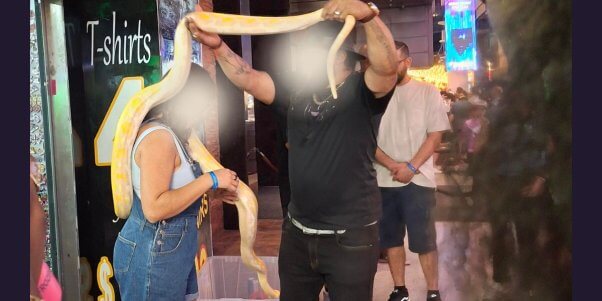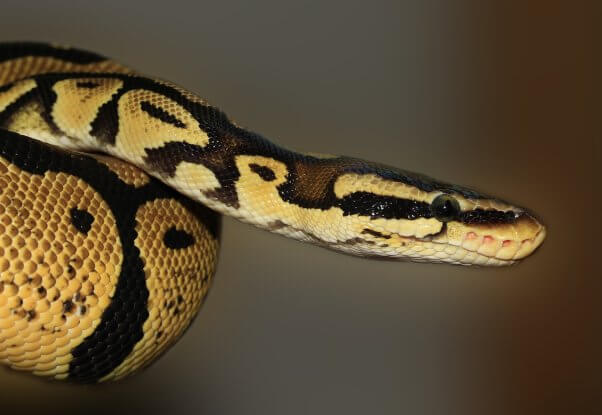What to Do if You Are Asked to Pose With Snakes in Las Vegas (or Anywhere Else)
When you plan a trip to Las Vegas, you know to look out for sharks at the poker table, but are you prepared for snakes on the Vegas strip?

Are There Snakes in Las Vegas?
Snakes native to the Las Vegas area, like rattlesnakes, avoid crowded areas like downtown Las Vegas, but some greedy humans carry large snakes like pythons and boa constrictors around the Las Vegas strip to earn a quick buck. Find out what to do if you see someone offering photos or other hands-on snake encounters to tourists.

Don’t Gamble With Safety: Why Exhibiting Snakes on the Vegas Strip Is Dangerous
People carrying snakes on the Vegas strip are putting their snakes’ lives and pedestrians’ safety in danger.
Danger to Snakes
Snake experts caution that snakes should not be kept in conditions where they are exposed to extreme temperatures without being able to move around to regulate their own body temperature. Snakes rely on their environment to maintain proper body temperature and can have severe health problems if ambient temperatures fall below 70 degrees Fahrenheit or above 95 degrees. When temperatures are near freezing, damage to a snake’s internal functions and external tissue could begin within 30 minutes of exposure.
An exhibitor who exposes a snake to extreme temperatures for prolonged periods of time jeopardizes the animal’s health and well-being. In Las Vegas, during the coldest months of the year, the temperature is often in the 30s–50s, and in the hottest months, the temperature can exceed 100 degrees, even at night. Temperatures near freezing can slow a snake’s metabolic processes or quickly damage tissue. Prolonged exposure to extreme cold can cause:
- Hypothermia
- Regurgitation
- Vomiting
- Death
Plus, repeated exposure (like being exhibited on the Vegas strip night after night) to too-cold temperatures will weaken a snake’s immune system and make the reptile more susceptible to infections and other health problems.
If You Do See a Snake Exhibitor, Look Out for Welfare Red Flags, Like:
- A snake who lies limply instead of moving or coiling—this may be a sign of sickness or improper care.
- A snake with a visible spine. A healthy snake should have a layer of muscle and fat covering their bones.
- Sunken eyes, unshed skin attached to the body, or wrinkled/loose skin, all of which are signs of dehydration.
- Open-mouth breathing, wheezing, nasal discharge, or other signs of disease.
- A snake forced to be outside in temperatures near freezing or in extreme heat.
- An exhibitor moving snakes from an open environment with cold temperatures to an indoor, heated space. Heating a cold reptile too quickly is very stressful and dangerous for their health.

Danger to Humans
Boas and pythons are constrictors, meaning they kill by coiling their body around their prey and squeezing. The squeezing force can be enough to kill human beings. Snakes don’t typically target humans, but their stress and fear responses are often heightened in an inappropriate environment like the Las Vegas strip. If a snake believes their life is in danger they will fight back—as many “pet” snakes have.
What to Do if You Encounter an Exhibitor Offering Snake Photos on the Vegas Strip
1. Say No, and Don’t Touch!
If you see someone carrying a snake in public (in Las Vegas, or anywhere else), always say no to any snake experience they offer. Humans can harm snakes without realizing it just by touching them, and the snake’s pain may go unnoticed since they can’t communicate their discomfort through sound. Plus, it’s dangerous for humans to touch snakes; reptiles can inadvertently pass diseases like salmonella, botulism, bowel infections, and other hazardous bacteria to humans.
2. Contact Authorities
Immediately contact local law enforcement with any welfare concerns so that the snake exhibitor’s location can be relayed in real time. Snake exhibitors don’t stay in one spot, so act fast and be sure to note their exact location. In Las Vegas, you should contact the City of Las Vegas Animal Protection Services (702-229-6444) or Clark County Animal Protection Services (702-445-7710).
How You Can Help Snakes in Seconds
Snakes aren’t props, photo-ops, or “pets.” They are conscious, free-willed individuals who can form meaningful relationships and have thoughts, preferences, memories, and problem-solving skills. Every animal has the right to live free from human exploitation.
If you see someone in Vegas exploiting a snake, report them immediately, and never buy a snake or any other animal from a store, breeder, or other animal trafficker.

